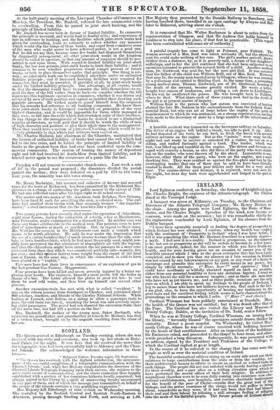SCOTLAND.
The Queen arrived at Edinburgh on Tuesday evening, where she was received with due state and ceremony, and took up her abode in Holy- rood Palace for the night. It was here that she received the news that the telegraphic wire had been successfully laid to Alderney and the Chan- nel Islands. She acknowledged the welcome information in these terms-
" Holyrood Palace, Tuesday night, 7th September.
"The Queen has received, with the highest satisfaction, the announce- ment of the successful completion of a telegraphic communication with the Channel Islands; and, while her Majesty congratulates the directors of the Channel Islands Telegraph Company upon their success, she rejoices in the more rapid means of communication, and the closer connexion thus happily established with a portion of her dominions hitherto locally separated, but always united to her Crown by a spirit of unswerving loyalty unsurpassed in any part of them, and of which the message just transmitted on behalf of the people of the islands contains a very gratifying expression." Her Majesty left Edinburgh at nine o'clock on Wednesday morning. She travelled by the Scottish Central and Scottish North-Eastern to Aberdeen, passing through Sterling and Perth, and arriving at 1.50.
Her Majesty then proceeded by the Deeside Railway to Banehory, and, having lunched there, travelled in an open carriage by Aboyne and Bal. later to Balmoral, arriving about six o'clock.
It is rumoured that Mr. Walter Buchanan is about to retire from the representation of Glasgow, and that Sir Andrew Orr holds himself ia readiness to step into his place, if that feat be practicable. [This report has been contradicted with some air of authority.]
A painful tragedy has come to light at Polmont, near Falkirk. The woman servant of a Mrs. Reid was taken seriously ill, but the physiciaa sent for could make nothing of her case. The girl's mother arrived, drawn thither from a distance, by, so it is gravely said, a dream of her daughter's sufferings, and to her the girl confessed that she had been subjected to an operation intended to prevent the natural birth of a child. Another medical man, Dr. Girdwood, was sent for, but the poor girl died. It was assumed that the father of the child was William Real, son of Mrs. Reid. However that may be, the young man hurried away to Glasgow, where he was arrested by a policeman and carried to Stirling Gaol. At the same time, a promising young medical man, Thomas Girdwood, son of Dr. Girdwood, hearing of the death of the servant, became greatly, excited. He wrote a letter, bought four ounces of laudanum, and getting a cab drove to Linlithgow. On his way he swallowed the poison. He was brought back to Falkirk, where he died. What share each of these young men had in the death of the girl is at present matter of inquiry.
William Reid is the person who last autum was convicted of having abetted the late Mr. Salmon in his embezzlements from the Falkirk Com- mercial Bank, but who was set at large before the expiry of the term of imprisonment to which he was sentenced, on a strong representation having been made to the Secretary of state by a large number of the inhabitants of Falkirk.
A horrible accident was transacted on the Inverness railway on Saturday. The driver of an engine left behind a break, too idle to pick it up. After he had disposed of the train he ran back to fetch the break with several railway servants on the engine. But as the " points " were snug for the night and not ready to receive BO unlooked for a visitor, he ran on to a siding, and rushed furiously against a bank. The tender, which was first, was lifted up and tumbled on the engine. The driver and fireman es- caped with scarcely a bruise, as also did three of the party who were stand- ing on the tender, who were thrown off by the shock. Lamentable to say, however, other three of the party, who were on the engine, 'met a most shocking fate. They were crushed so against the fire-plate and box by the overtopping tender that one of them may be said to have been literally roasted to death. All the three poor fellows only lived for a very short time. The engine-driver and fireman, it is reported, were not seen for the night, but next day both were apprehended and lodged in the gaol at Elgin.


























 Previous page
Previous page